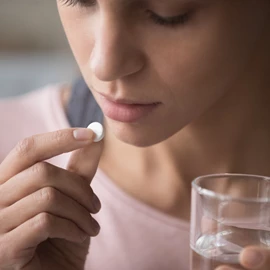How should I take LoviOne?
You should take one LoviOne tablet preferably within 12 hours, and no later than 72 hours after unprotected sexual intercourse. Do not delay taking the tablet, it is more effective the sooner you take it. It can be taken at any point in your menstrual cycle as long as you are not already pregnant. Do not chew the tablet, swallow it whole with water.
If you are currently using a daily contraceptive pill or other form of contraception, you can continue to take this as you normally would, at the regular time. If you have unprotected sex again after taking LoviOne, even if it is within the same menstrual cycle, the tablet will not have the same contraceptive effect and there may still be a chance of becoming pregnant. We recommend that you talk to a pharmacist, GP or other healthcare professional if you have any concerns surrounding taking emergency contraception.
How old do I need to be to take LoviOne?
LoviOne is available to those aged 16 or above. If you are under 16, speak to your pharmacist about the options available to you. You must be over 18 years old to buy LoviOne online.
What ingredients are in LoviOne?
The active substance in LoviOne is levonorgestrel. Each tablet contains 1.5 milligrams of levonorgestrel. Other ingredients include potato starch, maize starch, silica, colloidal anhydrous, magnesium stearate, talc and lactose monohydrate.
What is the difference between Desogestrel and Levonorgestrel?
Desogestrel is a synthetic version of progesterone, the female sex hormone used as a birth control in contraceptives such as Lovima. It is taken every day to prevent pregnancy. Levonorgestrel on the other hand, although also a synthetic progesterone, is used as an emergency contraceptive pill (morning after pill), such as LoviOne. This is used to prevent pregnancy if other contraceptive methods e.g. condoms, weren't used or have failed, or if you have had unprotected sex.
How does levonorgestrel work?
Levonorgestrel works primarily by preventing or delaying ovulation (the release of an egg) so that the sperm cannot fertilise it. Levonorgestrel has to be taken within 72 hours (3 days) of unprotected sex to prevent pregnancy, but it is most effective in the first 24 hours.
What are the side effects of taking LoviOne?
Not everyone will experience side effects when taking LoviOne, however some people will.
Very common (more than 1 in 10) side effects include:
- feeling sick (nausea)
- you might have some irregular bleeding until your next period
- you might have lower abdominal pain
- tiredness
- headaches
Common side effects (less than 1 in 10) are:
- being sick
- your period might be affected but most women will have usual periods, some cycles might vary by a few days.
- some irregular bleeding or spotting may be present
- tender breasts
- diarrhoea
- feeling dizzy
Very rare side effects (1 in 10,000 people) include:
- a rash
- urticaria
- pruritus
- swelling of the face
- pelvic pain
- painful periods
- abdominal pain
If you experience any side effects, you can talk to your doctor or pharmacist, even if they aren't mentioned in this list. You can also report side effects directly via the Yellow Card Scheme: www.mhra.gov.uk/yellowcard or via the MHRA Yellow Card app in the Google Play or Apple App Store.
When should I not take LoviOne?
The use of LoviOne is not suitable for you if:
- You are pregnant or think you might be pregnant
- Have a previous history of infection or inflammation of fallopian tubes or of ectopic pregnancy
- Have severe liver problems
- Have a disease of the small bowel e.g. Crohn's disease
- Are taking or have taken in the last 4 weeks any medicines to treat epilepsy, tuberculosis, HIV infection, fungal infections or herbal remedies containing St John's wort.
- Are allergic to levonorgestrel or any other ingredients in this medicine
If any of the above apply, you should discuss this with a healthcare professional to see what options may be suitable for you.
How effective is levonorgestrel in preventing pregnancy?
If LoviOne is taken within 24 hours of unprotected sex, it is 99% effective in preventing pregnancy. It is 84% effective within 72 hours of unprotected sex. It can only prevent pregnancy if you aren't already pregnant. It will not be effective if ovulation has already occurred or if an egg has already been fertilised.
Is LoviOne an abortion pill?
No, levonorgestrel is not an abortion pill and will not harm an existing pregnancy. It simply aims to prevent pregnancy, not end it. Levonorgestrel will not be effective if the ovulation has already occurred or if an egg has already been fertilised. It is important to note that taking more LoviOne tablets than recommended is not going to cause an abortion and does not improve the effectiveness.
Will LoviOne work if I am already pregnant?
LoviOne will not work if you are already pregnant. The role of levonorgestrel (the active ingredient in LoviOne) is to prevent ovulation to help stop the egg from meeting the sperm and getting fertilised. Therefore, levonorgestrel cannot be used as an abortion medicine. There is no evidence to suggest that taking levonorgestrel when pregnant will disrupt or negatively affect the outcome of the pregnancy, even in the very early stages. If the egg is already fertilised by the sperm, then levonorgestrel won't be effective. If you take more than one LoviOne tablet, this will not terminate the current pregnancy.
Are there any medicines that may prevent LoviOne from working effectively?
If you are taking or have taken in the last 4 weeks any medicines to treat epilepsy, tuberculosis, HIV infection, fungal infections or herbal remedies containing St John's wort, then LoviOne may not be suitable for you. This is because these drug-drug interactions could reduce the efficacy of LoviOne. We recommend that you tell your pharmacist or healthcare professional about any medication or herbal remedies you are taking to find the most suitable solution for you.
Will my weight influence the effectiveness of LoviOne?
There is limited and inconclusive evidence that the efficacy of LoviOne is effected with increasing body weight or BMI. Therefore, LoviOne is still recommended for all women regardless of their weight or BMI.
Can I take LoviOne when I am breastfeeding?
The active ingredient in LoviOne is levonorgestrel. When taking LoviOne, some levonorgestrel is secreted into your breast milk. It is suggested that you take the tablet immediately after breastfeeding and avoid breastfeeding for at least 8 hours following taking LoviOne. During this time, you should drain your milk with a breast pump for 8 hours following taking the tablet. This reduces the amount of active ingredient in the milk given to your baby.
Is there a limit to how many times I can take LoviOne?
LoviOne should only be used in emergencies, and not as a regular method of contraception. Frequent use of emergency contraception such as LoviOne can result in side effects such as menstrual irregularities. Use of LoviOne more than once during one menstrual cycle is more likely to upset your periods. If you would like more information about long-term contraception methods, then talk to your pharmacist or a healthcare professional.
What do I do if I have been sick after taking LoviOne?
If you have vomited shortly after taking LoviOne (within 3 hours), then this may mean that it has not been fully absorbed. If this is the case, then another tablet should be taken immediately. If you are unsure, speak to your pharmacist for advice.
Can I still take LoviOne 72 hours after unprotected sex?
LoviOne is effective up to 72 hours after unprotected intercourse. After 72 hours levonorgestrel may not be effective at preventing pregnancy. Therefore, this is not a suitable emergency contraception choice for you. You should talk to your pharmacist or GP to discuss other methods of preventing pregnancy.
Will taking LoviOne effect my fertility in the future?
LoviOne increases the possibility of disturbances in your menstrual cycle, which can sometimes lead to an earlier or later ovulation date, altering your fertile window. Although there is no fertility data in the long term, after taking LoviOne, a rapid return in fertility is expected, therefore a regular contraception should be continued or implemented as soon as possible.
Is LoviOne suitable for people with lactose intolerance?
LoviOne contains 120mg lactose monohydrate therefore if you are intolerant to this then you should contact your doctor before taking LoviOne.



